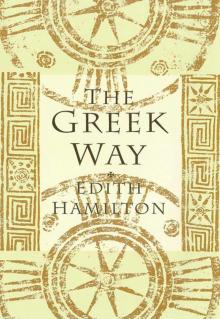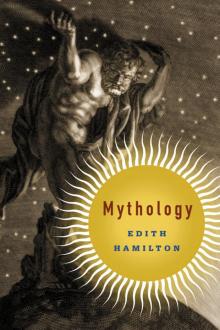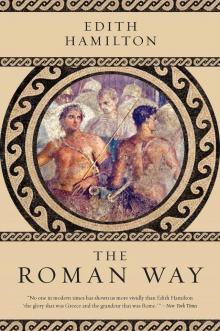- Home
- Edith Hamilton
The Roman Way Page 3
The Roman Way Read online
Page 3
The plays leave no possibility of doubt that although public life was denied the Roman woman, she could find a very fair outlet for her energy in the domestic circle. In Plautus’ Casina, a representative of the character Plautus is perhaps fondest of, the true ancestor of Pantaloon, is in love with his wife’s protégée and plans to have his bailiff marry her and then give her over to him. The wife counterplans with her maid to dress up the footman as the bride and take a spectacular vengeance. The maid opens the scene. She comes out from the house in high glee.
MAID: No games, I don’t care where, not even the Olympic,
Are half the sport the joke we’re playing our old man.
He’s bustling in and out in such a mighty hurry.
And there’s the bailiff all rigged up, so spick and span,
And mistress in her room is dressing up—the footman!
And oh, the lovely way she does pretend—They’re here!
(Enter old man. He speaks through door to his wife)
OLD MAN: I’ll take the bride and groom out to the farm. It’s safest.
Enjoy yourself here. I’ll dine there. But hurry, please,
And send them out. Until tomorrow then, my dear.
(Enter footman dressed and veiled as bride, wife and maid escorting him)
MAID: Now, do be gentle with this innocent young girl.
BAILIFF: Indeed I will.
OLD MAN: Go in. (nervously as the door shuts) My wife—is she still there?
BAILIFF: She’s gone.
OLD MAN: (dancing excitedly around bride) Hurrah! Oh, sweetheart, honey, flower of spring—
(They go off, and some time is supposed to have passed before the next scene, which discovers wife and maid waiting for the result of the instructions given the footman.)
MAID: (tittering) I’d like to see that bride and bridegroom now, I would.
WIFE: I’d like to see the old scamp’s face well battered in.
(They draw back as the old man enters, much dishevelled, tunic torn, all the signs of rough handling.)
OLD MAN: I don’t know how I’ll ever face my wife again.
But there—In I must go and pay her damages.
(to audience) Would one of you here like to substitute for me?
(Pauses a moment, then shakes his head) I just can’t stick it.
(Makes as if to run when enter footman)
FOOTMAN:Stop right where you are, old man.
(coyly) Now if you want to fondle me, sir, here’s your chance.
WIFE: (stepping out, followed by maid) Good day to you, young lover.
MAID: (joining in)How did your courting go?
FOOTMAN: (sobbing) He doesn’t love me any more.
OLD MAN:Wish I was dead–
The entire scene could have been played just as it stands by any commedia dell’ arte troupe. Not a character there that would not have been perfectly familiar to actors and spectators.
But there is one notable difference between what an audience would accept from women in Plautus’ day and in later times. The deceived husband, so familiar for so many centuries to the European stage, never appears in Roman comedy. There is no indication of any other bar to the activity of the Roman wife, but she could not put horns upon her husband’s head. No Puritan morality could be more unyielding on this point. The fact is thrown into high relief by the complete absence of any sex-morality in other directions. The courtesans are important characters in nearly every play and Terence’s most estimable youths have affairs with them which their mothers on occasion hotly defend. One of his irreproachable young men, passionately in love with such a lady, agrees to share the possession of her with a blustering bully in order that his own purse may be spared. Familiar characters, too, are the panderer or his female equivalent. In Plautus’ Comedy of Asses a lover is raging up and down before a house where doors and windows are all conspicuously closed:
LOVER: Thrown out of doors! That’s the reward I get
For all I’ve spent upon them. You’ll be sorry.
I’m off to the police—leave your names with ’em.
I’ll humble you, your girl too—
(Enter MADAM from house, very calm and pleasant)
MADAM: Go right on threatening. Such a state of mind
Means money down. Get off. Away with you.
The more you try, the quicker you’ll come back.
LOVER: And all I’ve given you! If I could have her
Just for myself now, why you’d owe me sums.
MADAM: (cheerfully) Oh, you can always have her—on condition
You give what’s asked—and more than other men.
LOVER: Be just a little kind. I’ll last you longer.
MADAM: (coolly) You miss the point. A lover’s like a fish
Where we’re concerned—no good unless he’s fresh.
Your sweet, fresh, juicy ones—ah, they’re the men.
They don’t care what it costs. They want to give.
To please their girl they’ll give to me, the servants.
Make up even to my little dog. Now come—(reasonably)
A woman’s got to look out for herself.
Such passages, side by side with the idea steadily presented throughout the plays of a sacrosanct family life, throw a flood of light on the kind and the degree of morality abroad in the Republic. The Romans were franker than our grandfathers were, but their basic notions of what could and could not be done were the same. Strict virtue within the house for everyone. Outside, all the pleasant vices for the men. A hard and fast division of ethics into male and female received its final consummation in Rome. The double standard which has been the world’s standard for all these centuries since, is formulated, complete to the last detail, in Roman comedy. In this respect the men of Greece were dull of wit compared with the men of Rome. Their astuteness did not rise beyond the four walls of the house for their women folk, with occasional assistance from bolts and bars, most futile of defenses, as story-tellers the world over have shown. Aristophanes has many a joke about the way Athenian women eluded them and the husbands they deceived. Nothing of the kind passed with a Roman audience of the Republic. The men saw to it that they were not deceived, and the way they did it was a triumph of Roman intelligence as well as of Roman determination. One of Rome’s greatest achievements, which has passed almost unnoticed, was the successful education of their women in the idea that their supreme duty was to be chaste. The popular story of Lucretia who killed herself when she was violated by force, completely innocent though she was in reality, and the story, even more popular, of the father acclaimed a hero because he killed his daughter with his own hand rather than have her live as the tyrant’s mistress, testify eloquently to the thoroughness of the women’s training. Thus disciplined they were safe to go abroad and enjoyed a degree of freedom civilized women had never known before. But the lesson was taught so cleverly, the idea that men’s pleasures, too, should be curtailed never entered the women’s minds. Their conviction of the all-importance of chastity, side by side with the conviction that it had nothing to do with men, is a proof of what the Roman mentality could accomplish when faced with a practical problem.
The whole matter bears directly upon the Roman character of the plays. Plautus’ women, who have so influenced the women of all later drama, were never drawn from Greek originals. In the Amphitryon, Alcumena is the model Roman matron complete, and the line of her descendants upon the stage is too long to be reckoned. On her—supposed—husband’s departure for the war she soliloquizes in words which recall all the soliloquies spoken by noble women the world over when the necessities of the drama require them to be abandoned by their lawful protectors:
Absent from me
So let him be,
If fame and glory come
With him triumphant home.
Bear and forbear,
Make my heart strong,
Through bitter care,
Days sad and long,
All this I can endure,
all and yet more,
If I may hear him hailed at last victor in war.
That prize enough for me.
His valor’s prize shall be
Mine. What is all the rest?
Valor is best.
(As she concludes, Amphitryon, her real husband, enters. The circumstances are complicated: Jupiter has been assuming Amphitryon’s form while the latter is away fighting, and has thus gained access to Alcumena with whom he is in love. It is he Alcumena has just taken leave of. Upon Amphitryon’s unexpected return, Jupiter has decamped, telling her he is due at headquarters. When Amphitryon enters she, of course, thinks they parted only a few moments ago. In this delicate situation she is the perfect Roman lady, indeed, the perfect lady of every age and clime.)
AMPHITRYON: (entering eagerly, followed by his slave) Joyfully I greet my wife, my own, my hope, the very best,
So her husband thinks, of all the ladies that the city holds.
You are well? Glad I am come?
ALCUMENA:Oh dear. Please don’t. I hate such jokes.
Why pretend we haven’t met before?
AMPHITRYON:We haven’t!
ALCUMENA: (not condescending to notice this) Back so soon? Weather? Bad news? Or what’s the cause? You told me you were due in camp.
AMPHITRYON: Told you? When?
ALCUMENA:Why keep on teasing? When? Some time ago—just now.
AMPHITRYON: (to slave) Why, she’s raving.
SLAVE:She’s asleep.
ALCUMENA:I? What’s this nonsense?
AMPHITRYON:Greet me, dear.
ALCUMENA: Yesterday I greeted you.
AMPHITRYON:When we made harbor just last night!
ALCUMENA: Nonsense. You were here last night and told me all about the war.
Here we dined and slept together.
AMPHITRYON:O my God!
ALCUMENA:What do you mean?
AMPHITRYON: She has had her lover here. She’s lost—seduced—my wife no more.
ALCUMENA: Sir, you neither know me nor my family. Take care. You will find
We are not that sort of people.
AMPHITRYON:You are bold.
ALCUMENA:No, innocent.
The real dowry that I brought you was not gold but purity,
Honor, self-control and reverence for the gods, my parents too,
Love to all my kin, obedience to my husband, serving him
In true faithfulness.
AMPHITRYON:My word, I’m so dazed I don’t know myself.
Madam, I’ll investigate the matter.
ALCUMENA:Dear me, Do, I beg.
Talk like this is so familiar to us, it is difficult for us to realize how new it was in the second century before Christ. It bears the true Roman stamp. There is nothing like it in Greek literature. Conscious virtue, noble declamation, a fine gesture—none of that is Greek. Where the Romans were all for exalted sentiments, the Greeks were singularly matter-of-fact, and this difference is an important reason, perhaps the chief reason, why we feel instinctively at home in the Roman way and strangers to the Greek. A certain amount of heroics is necessary for us.
Another point in this passage which is new to the student of Greek literature is the exaltation of woman and her purity. That, too, began in Rome. Greek tragedy, indeed, shows women of a greatness unsurpassed anywhere. The greatest figures are women, but the fact that it is so is never directly brought to mind. We are never made to feel, how wonderful that a woman should be like that, any more than, how wonderful that a man should be. Antigone and Iphigenia are as they are, just as Œdipus and Orestes are as they are. The sex is as little to the fore in the one case as in the other. But in Roman literature, as in our own, a woman is always a woman. Her sex is never in the background of the picture.
The idea, too, which our literature for hundreds of years has made familiar to us, that she is on a higher plane than any man has reason to be, goes back to Rome. It resulted, of course, from the insistence that chastity was strictly for women only.
Roman sentimentality, also, appeals to us, just as the lack of it in Greek literature repels us. Along with the comedy there is invariably in Terence and often in Plautus a love interest, a pair of unhappy lovers, whose troubles find a perfect solution as the curtain falls. The girl is always a model of beauty and virtue, the young man madly in love with her. They are never touched by any of the indecencies the other characters may indulge in; they are never humorous. The Roman audience wanted both sides: greedy courtesans and easily-tricked panderers and senile dotards to laugh at; good, sweet young people to sympathize with.
But the character that stands out first of all, far beyond even the dominating figures of the father and the expensive lady, is the slave. He is the ancestor of all the devoted and agile servitors, models of fidelity and never fazed by any of their masters’ difficulties, whom literature everywhere has made so familiar, but in Rome the rôle he played was more important than any given him since. The portrait of the Roman family would lack its chief feature without the slave and no Roman comedy could be written without him. In every play he is the chief personage, the only one with brains, who succeeds in fooling all of the people all of the time. But in spite of his gay assurance and his triumphant success, his terrible lot in Rome is continually suggested. One of Terence’s characters, represented as loveliest and kindest of ladies, offers her maid-servants for examination by torture to prove her innocence. The punishments the slaves are perpetually threatened with might well have given points to the inquisitors, and, obviously, the reason for the detailed descriptions is that they were delightfully humorous to the audience. The cross—the slave’s penalty, they called it in Rome—is often on the master’s lips. Sometimes, but only once or twice, there is a hint as to the slave’s side. In Plautus’ Braggart Captain a master is denouncing his slave, who in this case is innocent. As the list of tortures in wait for him is unrolled he turns on the speaker:
Don’t go on threatening. Well I know the cross will be my end,
My place of burial. There is where my ancestors all rest,
My father, my grandfather, and my great-grandfather, too.
My great-great grandfather. D’you think just words mean much to us?
It is difficult to understand how the hearers could have laughed at this and yet we must suppose they did. No doubt at all, the tide of human kindness, never high anywhere in the ancient world, ebbed perceptibly when Rome came to the fore, but on the other hand the actual suffering of the slave is very seldom shown upon the stage and the end is always that he is forgiven and rewarded. The enjoyment from the spectacle of actual danger to life and limb the Romans of the day reserved for the circus shows. They did not care for it in the theatre.
On the whole, the general impression the plays leave is that they were written for fairly decent, sober-living folk, completely moral within their homes and even outside wanting nothing decadent. The obscenity is moderate judged by Aristophanic standards. There is a genuine feeling, too, for justice and fair play, and vice and virtue must always have their deserts. Once only Plautus fails to live up to this ideal and at the end of a play shows two bad old men enjoying themselves with two girls who had begun by making fun of their white hairs. The curtain falls on their triumph, but Plautus knew his public and was ready with an antidote. There is an epilogue holding up to reprobation all the elderly who act like that. Terence never had to apologize for his endings. He assigns rewards and punishments with impeccable correctness.
It is a world far removed from Elia’s “land of Cuckoldry, the Utopia of gallantry, where pleasure is duty and manners perfect freedom.” No fancy roams in it, whether to Utopia or anywhere else; gallantry is undreamed of; freedom is equally remote; pleasure, of the physical variety alone. It is a sordid place, inhabited by people whose standards are at best those of a dull respectability, whose ideas are completely ordinary, not to say stodgy. There is no suggestion of distinction or charm anywhere. Terence, to be sure, shows now and again a flash of i
nsight, as in his famous “I am a man and nothing in mankind do I hold alien to me.” The younger comedian was intellectually superior to the elder, but even so the flashes are few. Terence’s world, too, lies on the dead level of the commonplace.
Fragments of Menander have come down to us which show that neither he nor his audience had quite forgotten the great Greek tradition:
I hold him happiest
Who before going quickly whence he came,
Hath looked ungrieving on these majesties,
The world-wide sun, the stars, water and clouds
And fire. Hast thou a hundred years to live or but
The briefest space, these thou canst always see.
Thou wilt not ever see a greater thing.
There is not a passage in Plautus or Terence that recalls ever so faintly anything like this, not one that points to something poetical in their model, however dimly apprehended. A single sentence of Plautus’, perhaps, should be excepted; at any rate it gives one pause, it is so strangely unlike the self he shows elsewhere:
The poet seeks what is nowhere in all the world,
And yet—somewhere—he finds it.

 The Greek Way
The Greek Way Mythology
Mythology The Roman Way
The Roman Way